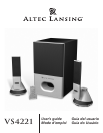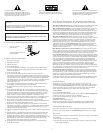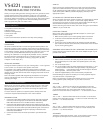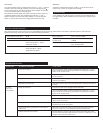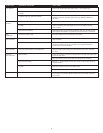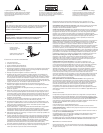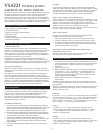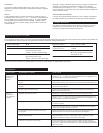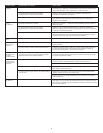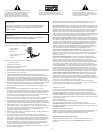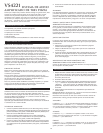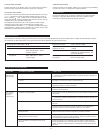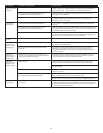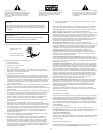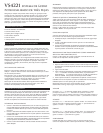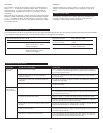
2
Thank you for purchasing this Altec Lansing product. For generations, Altec
Lansing has been first in audio innovation. Today, our line of powered
speakers has received more performance awards than any other brand. In
all kinds of desktop environments, in every price range, Altec Lansing offers
sound of distinction — giving even the most demanding customers the
audio enjoyment they seek. Just listen to this!
Box Contents
• Two speakers and one subwoofer
• Wireless remote
• Remote mounting bracket
• 3.5mm stereo cable
• User’s guide
• Quick connect instructions (located on inner-flap of the package)
Placing Speakers
Subwoofer
All stereo-encoded information is heard through the satellite speakers. The
subwoofer contains no stereo imaging, and its sound is non-directional. As a
result, the subwoofer doesn’t have to be placed in any particular relationship
to the satellites. However, placing the subwoofer on the floor close to a wall
or room corner provides better bass efficiency and optimum sound.
Warning: The subwoofer is not magnetically shielded. As such, it SHOULD
be placed at least 2 feet (0.6m) from TVs, computer monitors, computer
hard drives or any other magnetic media (e.g. floppy disks, Zip disks,
computer or audio tapes, etc.).
Satellite Speakers
Arrange the satellite speakers to suit your listening tastes — from right next
to the monitor to as far apart as the speaker cords allow.
For optimum sound, satellite speakers should be placed in a left/right
configuration, preferably apart and at equal distance from the center of the
listening area. This will offer the best stereo imaging and provide the most
satisfying results.
Note: The satellite speakers ARE magnetically shielded and can be placed
close to video displays such as TVs and computer monitors without
distorting the image.
Making Connections
Warning: Do not insert the speaker system’s power plug into a wall outlet
until all connections are made. Also, turn off audio source (i.e., your PC,
MP3 player, Sony PlayStation, etc.) before connecting the outputs to the
speaker system’s inputs.
To ensure first-time operation as expected, please carefully follow the
connection sequences described below in the order indicated.
Speaker System
1. Connect the right satellite speaker (with a thicker cable and orange DIN
connector) to the orange input on the back of the subwoofer, labeled
RIGHT. Note that the arrow on the DIN connector must face up.
2. Connect the left satellite speaker (with a thinner cable and a brown RCA
connector) to the brown input on the back of the subwoofer, labeled LEFT.
3. Connect one end of the audio input cable (with lime green connectors at
each end) to the matching lime green input plug on the back of the
subwoofer, labeled INPUT.
4. Connect the other end of the audio input cable to your desired audio
source.
Inputs
Various connection schemes between your audio source and the speaker
system are available. Determine if you’ll be setting up the speaker system
for PC audio/PC gaming, DVD playback, console gaming or with portable
audio devices (such as MP3 or portable CD players), then skip to the
appropriate section.
PC Audio/PC Gaming/DVD Playback
All PC sound cards have audio outputs. Typically, the outputs will be marked
as “front output” and “rear output.” In some cases, slightly different
terminology may be used. The sound card’s documentation should help you
determine which outputs to use with your speaker system.
Connect the lime green 3.5mm stereo cable to the lime green input labeled
“FRONT” on your sound card.
Console Gaming
Most console game systems feature dual-RCA outputs. To connect your
speakers, follow the steps below:
1. Make sure the power to your console gaming system is turned off.
2. Locate the red and white RCA cable that came with your console
gaming system.
3. Connect one end of the RCA cable to the matching red and white RCA
jacks located on the back of the subwoofer, and the other end to the back
of your console gaming system.
Portable Audio Devices (MP3, Portable CD Players, etc.)
Connect the lime green 3.5mm stereo cable to the headphone jack on your
portable audio device.
POWERING ON
1. After all other connections are made, plug the AC power cord (on the
back of subwoofer) into a wall outlet. The speaker system is now ready
to operate.
2. Turn on the audio source.
3. Turn on the speaker system by either simultaneously pressing the “+” and
“–” buttons located on the side of the right satellite, or by pressing the
stand-by button on the wireless remote. An LED will light on the front
of the right satellite when the power is ON.
4. Install the supplied battery in the remote’s battery compartment.
CAUTION: Danger of explosion if battery is incorrectly replaced. Replace
only with the same or equivalent type
Note: To avoid hearing a popping sound when you turn on your Altec
Lansing speaker system, always turn on your audio source first.
Volume
The “+” and “–” buttons on the side of the right satellite control the
master volume. The “+” and “–” buttons marked with the word “volume”
on the wireless remote also control the master volume. Press the “+”
button to increase the volume, and press the “–” to decrease the volume.
Treble
The “+” and “–” buttons marked with the word “treble” on the wireless
remote control the treble. Press the “+” button to increase the treble, and
press the “–” to decrease the treble.
Bass
The “+” and “–” buttons marked with the word “bass” on the wireless
remote control the bass. Press the “+” button to increase the bass, and
press the “–” to decrease the bass.
Loudness
The button marked with the word "loud" on the wireless remote contours
the high and low frequencies to maximize the perceived audio.
VS4221
Three-Piece
Powered Audio System



